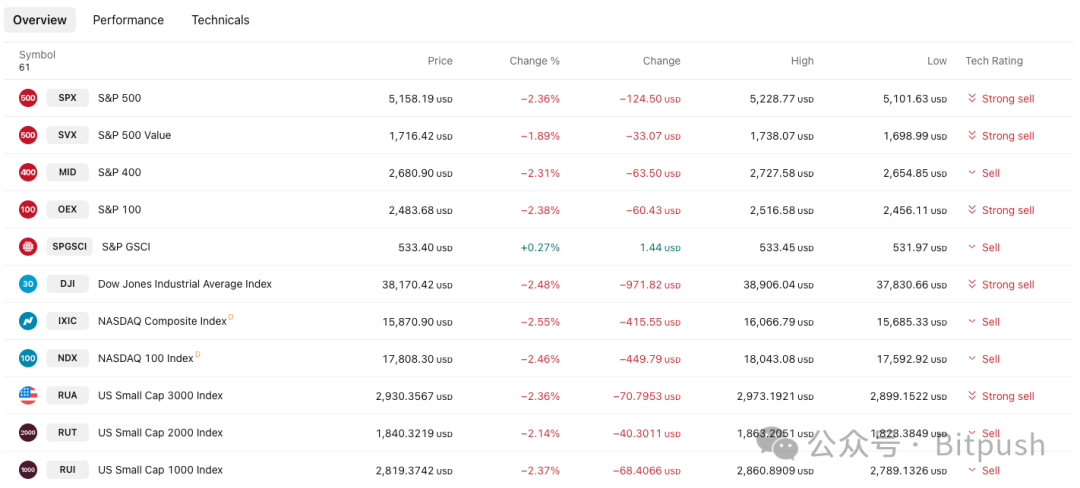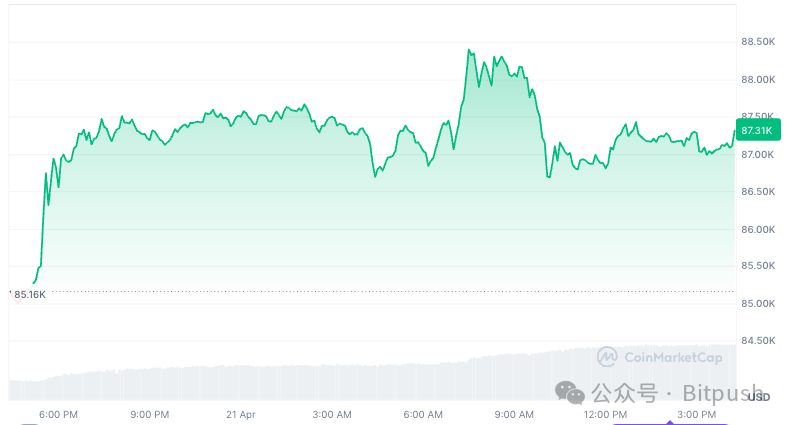Author: BitpushNews Mary Liu
A wave of "sell U.S. assets" trades are underway as markets worry that U.S. President Donald Trump may follow through on his threat to fire Federal Reserve Chairman Jerome Powell and implement policies that lead to a recession.
Data showed that the S&P 500 index plunged 2.7% to 5,142.18 points on Monday, down 13% from the beginning of the year and 16% from its recent high; the Dow Jones Industrial Average fell 972 points, a drop of 2.5%; and the Nasdaq Composite Index fell into bear market territory, down 21% from its peak.
The bond market was also not optimistic, with the 10-year U.S. Treasury yield rising 7 basis points to 4.41% and the 30-year yield jumping 10 basis points to 4.91%. In the foreign exchange market, the U.S. dollar index fell 0.9%, depreciating by more than 5% against the euro and the yen, hitting a three-year low.

Investors are grappling with the risk of Powell's possible dismissal, which the White House said last week it was evaluating, and the potential impact of Trump's policies on the world's largest economy, and have been fleeing U.S. safe-haven assets. This, combined with broader risk aversion, sent gold soaring to a record high on Monday and cryptocurrencies also rallied, with Bitcoin hitting $88,000 for the first time since March.

Recession + Fed independence concerns = adding insult to injury
"Any attempt to remove Powell would exacerbate downward pressure on U.S. assets at a time when the current administration is already injecting increasing levels of uncertainty into the economic outlook," said Ian Lyngen, head of U.S. rates strategy at BMO Capital Markets.
Trump again called on the Federal Reserve to cut interest rates on Monday via Truth Social, writing: "Many are calling for a 'preemptive rate cut.'"
Although legal scholars say Trump would find it difficult to fire the Fed chairman easily and Powell has said he would not resign if Trump asked him to, speculation still dealt a fresh blow to U.S. assets. Washington’s aggressive trade tariffs have raised fears of a U.S. recession and heightened doubts about the status of U.S. Treasuries as the safe-haven asset of choice.
Multiple risks are fueling market concerns about the path of economic growth and inflation — and how the Federal Reserve will balance the two. While traders expect the Fed to cut interest rates at least three times this year, former New York Fed President Bill Dudley wrote in a Bloomberg Opinion column that policymakers may move more slowly than expected.
The Bloomberg Dollar Spot Index fell as much as 1% on Monday to its lowest level since the end of 2023, before paring losses slightly. The yen rose to its highest level since September last year, while the euro surged to its highest point in more than three years.
The euro is trading around $1.15, close to strategists’ most optimistic year-end forecast. The yen is trading around 140.50 per dollar, stronger than the median year-end forecast of 143, according to Bloomberg data.
"Trump's comments about possibly firing Fed Chairman Powell, even if those ideas do not materialize, are seen by the international community as a major threat to the Fed's independence and, by extension, the dollar's status as a safe-haven currency," said Helen Given, a foreign exchange trader at Monex.
“If the U.S. economy were to fall into a recession and the central bank couldn’t or could not act independently, that recession could deepen, creating more concerns for the market,” she added.
Traders in the options market are as bearish on the dollar as they have been since the Covid outbreak. The premium paid to hedge against a fall in the dollar against a basket of currencies over the next year, relative to positions betting on gains, has reached its highest level since March 2020.
Monday’s sell-off intensified after Kevin Hassett, director of the National Economic Council, said on Friday that Trump was looking into the matter. Several hedge funds joined in selling the dollar on Monday after Hassett’s comments, according to traders familiar with the matter, who requested anonymity because they were not authorized to speak publicly about the matter.
Hedge funds’ bullish sentiment on the dollar has fallen to its lowest level since October, according to aggregate data from the Commodity Futures Trading Commission. While headlines about Powell certainly didn’t help sentiment, others said the worsening global trade war could continue to dominate dollar trading.
“Central bank independence is so valuable — it’s not something you can take for granted and once lost it’s very hard to regain,” said Will Compernolle, macro strategist at FHN Financial in Chicago. Trump’s “threats against Powell will not help foreign investor confidence in U.S. assets, but I still think the tariff news was the primary driver,” he said.
The extra yield that investors demand to hold 30-year bonds instead of two-year notes has risen for nine straight weeks, only the second time that has happened since Bloomberg began compiling the data in 1992. Strong front-end demand through block trades in two-year futures in early trading Monday further fueled the steepening trend in the yield curve.
Short US dollar, long gold and Bitcoin
Warnings from Wall Street stock strategists are growing as Trump’s trade war undermines the outlook for U.S. economic growth and earnings.
Citigroup strategists last week downgraded their outlook on U.S. stocks, saying cracks in "American exceptionalism" will persist. They joined Bank of America Corp. and BlackRock Inc. in recent days in betting against U.S. stocks.
"The latest catalyst for the dollar sell-off may be to put pressure on Powell, but the reality is that the dollar sell-off doesn't need any more reasons," said Gareth Berry, a strategist at Macquarie in Singapore. "What has happened in the past three months has provided more than enough reasons for a sustained dollar sell-off that could last for months."
Meanwhile, Lawrence McDonald, former director of U.S. macro strategy at Societe Generale, said now might be the time to sell gold and buy Bitcoin.
He commented on X: “With the VIX approaching 30, Bitcoin has never performed so well. This is a strong signal of the maturity of the Bitcoin market (good news) and a strong proof that fiat currencies such as the US dollar are under great pressure.”











